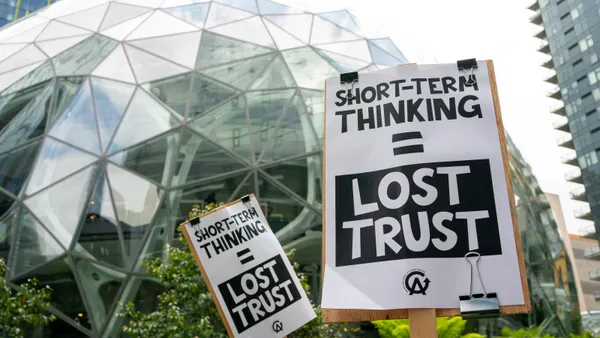Dive Brief:
- A new study by Optimized Workforce found that more than 32% of U.S. workers are already exposed to some type of artificial intelligence (AI) on the job. According to the study, AI Opportunity Report 2018: Which Industries Are Investing in AI? Which Ones Should Be?, in 2019, an additional 6% of workers will start using AI tools for the first time. The study estimated that AI-enabled document creation and classification will drive industry investment in AI next year. Participants in the study represent 19 of the 20 Census Bureau NAICS codes and all the Bureau of Labor Statistics' occupational codes.
- The study cites the construction industry as the biggest investor in AI, a record it's expected to continue holding in 2019. On the flip side, healthcare isn't investing enough, according to the study, given the task efficiencies the technology provides. Although supplanting burdensome administrative tasks is a common use of AI, more strategic applications, like scenario planning, will pick up next year, study results showed.
- In another key finding in the report, the 15% productivity gains from AI won't mean a 15% decrease in employment. More than 13% of respondents in the study said they spend so much time on tasks that AI could do more efficiently, that they're missing out on meeting business goals.
Dive Insight:
Organizations are fueled by high productivity, efficiency and controlled costs — three drivers that AI can address now and into the future.
Craig Desens, Optimized Workforce adviser, describes AI as the technology of the here and now: "AI is not the future of work, it's the present," he said in a statement. "Before we conducted this large-scale survey of U.S. workers, we were predicting AI adoption through macroeconomic indicators. Now we have a more detailed view of the current state."
Employers that are still doing tasks AI is already doing more efficiently are setting themselves back in time, tech experts have said. For instance, AI is speeding up the recruitment process and, as a result, making filling posts and replacing workers a less costly endeavor. While the technology still has its pitfalls, some experts have even said that AI could soon predict candidate potential — though it would still need a lot of honing by recruiters.
A Conversica poll found that half of white-collar workers spend much of their workdays doing repetitive tasks bordering on drudgery. The resulting boredom and frustration have negatively affected their emotional wellbeing. But the survey also discovered optimism among respondents about new artificial intelligence (AI) advancements, which could free them up to complete more fulfilling tasks that are both creative and challenging.









